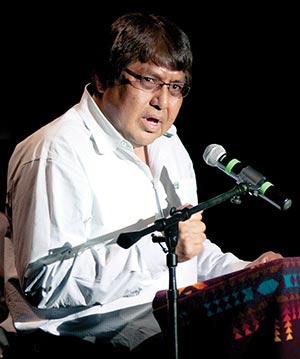Begay: If you want the mine run right, elect a miner
By Cindy Yurth
Tseyi' Bureau
CHINLE, June 19, 2014

Edison Begay
That's the opinion of Edison "Chip" Begay, a career coal and copper miner who is hoping the public is ready to oust the career politicians and vote for somebody who's wiling to get his hands dirty.
"We bought a coal mine," said Begay. "Good! But how are we running it?"
Begay cited the Navajo Transitional Energy Company, which will manage the Navajo Mine recently purchased from BHP Billiton, along with other energy projects.
"Only 30 percent of them are Navajo employees," he said. "The majority have no coal mining experience altogether. We as Natives with 30 years experience, we were never looked at.
Begay also said the Nation's behavior has been inconsistent.
"Where were they when we were trying to sell the McKinley Mine?" asked Begay, who worked there for 33 years and rose to upper-level management. "We had machinery we were practically giving away; we had buildings we were giving away. We had power lines all the way from Mexican Water to Tsayatoh. We had a rail line. We tore it all down and backfilled it because we couldn't get the Navajo Nation interested.
Asked if the Nation should get into renewables as well, the 57-year-old Begay said, "Definitely.
"When you're dealing with mining, you always have to have a Plan B," Begay explained. "The coal can run out, the customers can run out.
"A while ago, the power went out for eight hours all the way from Grants to Sheep Springs because somebody cut the power line for the copper. What if the Navajo Nation could just switch over to our own solar and wind turbine grid and not be dependent on that power line? What if we produced our own electricity for our own needs? How great would that be?"
Another plank of Begay's platform is cutting waste, which he said is also something he learned in the competitive energy business.
"We have houses sitting around, we have big buildings sitting around like the old glove factory near Fire Rock," he mentioned. "Why can't we put some money into fixing up what we already have instead of just tearing things down and starting over? We have all those vacant houses in Shiprock, and people are buying tool sheds to live in because they don't have houses.
The candidate also believes the various governmental departments are too siloed.
"In the companies that I worked for," he said, "There's one information system for the whole company.
"We are not utilizing that kind of technology as a tribe. The president's office, the departments, the NHA, everyone down to the chapter governments should be able to access the information they need and share with each other.
Abolishing secrecy would make it much harder for corrupt individuals to steal tribal funds, Begay believes.
"The first thing we need to do is to get our reputation back," he said. “Right now, nobody on or off the Navajo Nation trusts the Navajo Nation government. And in the border towns, Navajos are thought of as drunks and panhandlers. We're not taking care of our people who have the illness of alcoholism.
As far as what he would do for voting blocks such as youth, veterans and elders, Begay is a firm believer in a rising tide floating all boats.
"If we had better economic conditions, if we had jobs, the youth could come back," said Begay, who is To Dich'iinii born for Tabaaha. "If we had a better economy, we could do more for our veterans. We could build our own nursing homes for our elderly, so they wouldn't have to live out their days in places outside the reservation. We wouldn't have to tell people, 'Your kids can't have a scholarship, you make too much money.'"
That said, Begay does not believe economic development should come at the price of sacred sites.
"Those sacred sites are where we come from as Navajos," he said. "If we destroy our sacred sites, I don't know how we can call ourselves Navajo."
How to get The Times:

